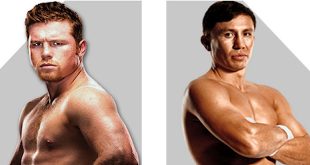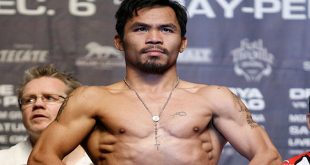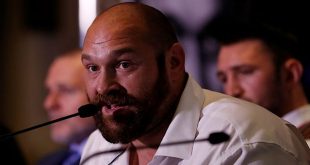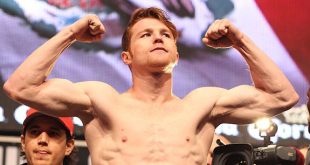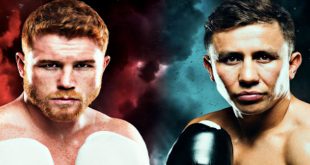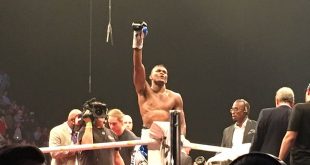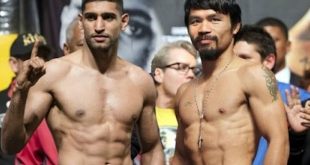Andre “The Matrix” Dirrell has been a highly touted prospect since his amateur days. With 231 wins, an Olympic Bronze medal in 2004, a competitor at the 2003 Pan-Am games, and two US National amateur titles, one in 2003 at middleweight the other in 2001 at featherweight it is no wonder he had promoters wanting to offer their services before even announcing his intentions on turning professional.
When Dirrell did turn pro in January of 2005, everything went according to plan and then some. His first eleven bouts were nothing short of boxing clinics. As each bout progressed it was evident that Dirrell was able to transition his amateur style into one that would benefit him greatly in the pro rankings, something that many amateurs with lengthy careers have a problem with as they can not avoid the point system ingrained into them.
Instead, he turned his hit and not be hit style into one that often had opponents looking foolish, stopping seven of his first eleven inside three rounds or less. In 2007, the transition period was over for Dirrell as he and his team began to seek out the other top super middleweight prospects, ready to make the jump from up and comer to legit contender.
Curtis “Showtime” Stevens was first up. The hard hitter from Brooklyn had won 17 of his 18 bouts and was on a four fight win streak when they met, Dirrell easily outpointed him to a unanimous decision victory. After a few keep busy bouts, Dirrell faced highly thought of Anthony Hanshaw in 2008, Hanshaw had lost only once in his 22 bout career, a decision to Roy Jones Jr at light heavyweight. Hanshaw managed to go five rounds after being dropped once in the fourth before the affair ended.
Three months later undefeated Mike Paschall’s record was adjusted to 17-1 after four close rounds. To end 2008, Dirrell picked up his first minor title when he beat up the hard punching Australian based Victor Oganov at just 28 seconds of round six.
When 2009 began, Dirrell has established himself as a top 168lb fighter and his interim WBO NABO title earned in the defeat of Oganov had him on the trail to a world title shot via express lane, but an even bigger opportunity would come Dirrell’s way sooner then expected.
Showtime had developed a tournament in an attempt to clear up confusion as to who was the best fighter at our talent stacked 168lb division, a division that had long been one of scarce talent, more often than not used for nothing other than a stop over to light heavyweight. Since suddenly more world class talent then one knows what to do with was floating around, the time seemed perfect for such an event.
It would be a six man point based elimination tournament, each fighter would fight a different opponent in the round robin stage gaining points. The four fighters with the most points would meet in the semi finals then the winners of the semis would meet in the finals to become tournament champion. There would not only be a trophy awarded but there would be two world title belts to walk away with as WBA and WBC championships would be involved.
Dirrell would receive an invitation to participate, which helped stamp his status as a world class fighter in one of boxing’s deepest talent pools. The rules seemed easy enough and if Dirrell just kept doing what he has been for the last 18 bouts, he would be assured the tournament prize. Of course, he first would have to get past some of the best fighters of the division this era has to offer.
In the competition with Dirrell would be fellow 2004 Olympian, long time friend and undefeated contender Andre Ward, former undisputed middleweight champion Jermain Taylor, former IBF middleweight title holder Arthur Abraham, then current WBC super middleweight title holder Carl Froch and WBA super middleweight title holder Mikkel Kessler. It was the cream of the crop as old timers would say; just to be included in this group of participants showed the world Andre Dirrell was a serious force to be reckoned with.
His first bout was slated to take place October 17th 2009. Round one started out well for Dirrell, who had been issued WBC title holder Carl Froch as his first opponent. The bout would take place in Nottingham, England, Froch’s hometown, but this seemed to bother Dirrell very little as he prepared for the fight.
The bout was a close one where Dirrell did much of what Jermaine Taylor did during his highlight moments when facing Froch. Speed killed the aggressive style of the British title holder. When Froch did land, it was not with full effect and before getting off anything more then one more punch, Dirrell would be safely out of the way and ready to return fire. A questionable call and point deduction for supposedly pulling down on Froch’s head when he lead in with it to attack cost Dirrell dearly. The final result was an SD win in Carl’s favor that brought disapproval even from hometown fans.
The loss was nothing to panic about though as others fared even poorer in their first round bouts. Jermain Taylor was knocked out by Arthur Abraham, causing him to leave not only the tournament but boxing itself for safety reasons. Mikkel Kessler, the odds on favorite, lost his WBA title to Andre Ward when they met on November 21st 2009.
Going into the second round of the tournament, Abraham led with three points due to a knockout win. Ward and Froch were tied with two points each, Dirrell and Kessler had zero pints due to their losses and Allan Green, the replacement for Taylor, was also sitting with zero points. With two rounds left before the semi finals, there was plenty of time to catch up and advance so Dirrell had little to worry about, at least when it came chances to make up some more points.
Second up for Dirrell in March of 2010 would be hard hitting former IBF middleweight title holder Arthur Abraham. This time Andre would have home town advantage fighting at the Joe Louis Arena in Detroit, Michigan. The bout had a packed house with classic boxer versus puncher drama surrounding it.
When the fight began, Abraham, who usually sits back the first few rounds blocking shots by his opponents with a high tight defense, absorbing little but arm damage while he figures out his opponent’s timing, did not find his usually successful style so accommodating. Andre was the aggressor, a role he usually leaves for his opponent’s before countering them with accuracy and speed to kill, landing on Abraham often with authority.
In past bouts, Dirrell used speed to accumulate damage for his knockouts. This time, he was just bulling Abraham. Round after round, Dirrell put on a show for the hometown fans, until the eighth round when Abraham started to catch Dirrell with a few of his own shots. Nothing seemed to really hurt the Flint, Michigan native outside an occasional body punch.
In round 11, with Dirrell ahead on all three judge’s scorecards and Arthur on the attack, Andre gets caught and put down to a knee, a punch he could have easily recovered from except Abraham threw in another hook to the right temple for good measure while Andre was sitting on the mat back against the ropes, putting Dirrell’s lights out for the night. Referee Laurence Cole immediately called for a disqualification.
Many watching around the world and those in attendance questioned how hurt Dirrell was, as it seemed there was a delay in his losing consciousness. Luckily, Dirrell did recover, or so we thought, and made it out of the arena and home after some short neurological testing. He would be ready to fight whoever was next in the third round in his quest to the semi finals. That opponent turned out to be friend and WBA champion Andre Ward, who defeated Allen Green, the man who replaced Jermain Taylor in his second round bout on June 19th 2010.
While doubts still lingered about the extent of Dirrell’s injury when he faced Abraham, regardless. he was slated to continue. Mikkel Kessler became tournament dropout #2 after beating Carl Froch and winning the WBC super middleweight title in the process. Allan Green, the new comer, remained with zero points, Arthur Abraham had three points for his win over Taylor by stoppage, Dirrell and Froch were tied with two points each for their wins.
No one was out of the running, everyone seemed to be suffering in one way or another from the Super Six pressure win or lose. Enter as well Glen Johnson, the former light heavyweight champion who replaced Kessler, who injured his eye and needed surgery.
When Dirrell was to step in the ring next round to face Andre Ward, it would not only be his first time squaring off against such a close associate but the WBA title would be on the line. Several dates for the bout were proposed to the public but then canceled; Public relations departments for both fighters and the Showtime network stated it was a mis-communication error and the date would be announced later.
In the meantime, Glen Johnson vs. Allan Green was announced for November 7th 2010. Just weeks before that, fight an announcement was made from Dirrell’s camp that he would have to pull out due to the injuries caused in the Abraham fight as a safety precaution.
Almost from the second that was announced, cries of “Excuse” and “Faker” began to surface by fans and media alike; comments made by people who know nothing about Dirrell’s situation behind the scenes, his doctor reports, or the concerns of his family. Andre’s wife and parents openly stated he was not acting correctly since the Abraham bout; he was forgetful and seemed just a little bit off for lack of a better term.
Upon further testing by medical professionals, it was advised Dirrell should take a break and let his brain settle down more. The punch from Abraham while downed was in a very sensitive spot. The temple does not need an overly hard blow or an over abundance of damage to injure. Andre Dirrell is a young man with a family and if he waits, he can return to boxing with no problems. Why risk all that for this next fight, the sake of the Super Six or anything else that will not benefit him or his loved ones after boxing is over?
Do we forget the tragedies that haunt boxing today? Yet, if Dirrell fought this next bout so soon and was injured for life, or dare I say injured to the point it caused his death, those same people who called him a faker or stated he was using it as an excuse to pull out of a tournament he no longer desires to compete in, would be the ones calling out the most common of boxing’s tragedies.
The names Benny Paret, Deuk-Koo Kim, Gerald McClellan and Johnny Owen would be mentioned more inside the week of Dirrell becoming injured if he fought then when the men actually were in their primes. It would be a Catch 22. The same ones who cried he was looking for a way out would show false sympathy, forgetting they were one of the masses who called for the bout to happen.
It can not be both ways. Boxing is a sport and while we crave the knockouts, we love even more to see our retired warriors ten years down the line doing well, reliving nostalgia.
Andre Dirrell has made the right decision, I in no way believe that he is the type of fighter who would use this as an excuse to avoid a fight, fights he has already committed himself to.
Dirrell leaving the Super Six tournament and taking a rest so he can come back at 100% is a very, very smart decision. Those who don’t know anything about what they speak of maybe should keep their opinions to themselves. That I am afraid would be asking too much.
It is of great importance to take every precaution before allowing yourself to be hit in the head again by men who feed their families hurting other men.
Dirrell’s critics might have already been hit in the head once too often themselves and if that’s the case, they might want to start out with something small before the pressure of knowing when to shut up is thrust upon them. Maybe spelling their names or learning their phone number?
 Boxing News Boxing News
Boxing News Boxing News
